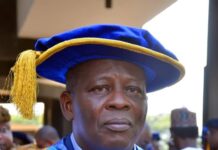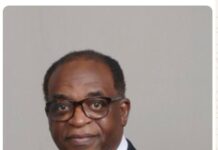 When he ended his career in guerrilla journalism and returned to Nigeria, I was sure it wouldn’t take time before any president of Nigeria grabbed him and made him a member of a team with ‘embedded autonomy’ to think for Nigeria. A team with embedded autonomy in the real sense of the word is one badly missing ingredient in the management of political power in Nigeria.
When he ended his career in guerrilla journalism and returned to Nigeria, I was sure it wouldn’t take time before any president of Nigeria grabbed him and made him a member of a team with ‘embedded autonomy’ to think for Nigeria. A team with embedded autonomy in the real sense of the word is one badly missing ingredient in the management of political power in Nigeria.
Anyway, such is where I thought Kayode Fayemi would belong. This is for the simple reason that he already straddled many frontiers by the time he came back – from academia to ‘journalism’, to NGOism and activism, broadly. So, beyond his having good certificate education, he had also acquired political education without which certificate education could even be a minus. Great joy, therefore, welcomed his foray into politics and emergence as a governor. He, along with Adams Oshiomhole, Sule Lamido and Rotimi Amaechi, became the governors to watch in the sense that they are all traceable to political traditions that raised popular alternatives in Nigeria. By that, I mean the labour tradition, the NEPU-PRP tradition and the student nationalism of the 1980s respectively and we cannot stop assessing them on those terms, whether they like it or not.
In the case of Fayemi, he became a governor under the dominant party in his region, an additionally favourable condition in that, unlike Mimiko, he didn’t have to be looking over his shoulders. Against this background, I personally pencilled him down to beat the Balarabe Musa record in quality governorship in the history of Nigeria. I kept asking Otive Igbuzor if Fayemi is performing wonders. I was so concerned I even offered to go and ‘cause confusion’, our own way of saying, I would visit, look around and write a critical celebration which the governor would admire as much as he would hate but which he could never dismiss. But Otive always answered yes, that Fayemi was performing in the Balarabe sense, a claim which Jibo (Jibrin Ibrahim), the intellectual patriarch of the Fayemi project in politics repeated in his unusually laboured column last Monday on the Ekiti election. And from where I came to the conclusion that ‘we’ in politics are still a problem to ‘ourselves’ the same way Gorbachev dismantled the Leninist State without knowing he was heading there. Contentious claim eh!
There is a serious problem in ‘our’ self-understanding. ‘We’ don’t seem to appreciate the fear of and the contempt in the Nigerian establishment for the elements brought to the social equation by the protest culture – student activism, guerrilla journalism, mass action and rationalism even. There are many examples to cite but the impeachment of Balarabe Musa must still be the best example. In other words, people of Fayemi’s background and orientation are an anathema to the body politic. I am certain that even within the Tinubu caucus, he must have had to master certain intricacies to survive.
The assumption is that the good certificate education, the political education, exposure/global insertion, youth and party/godfather shields had prepared him to anticipate and neutralise the contextual challenges. It is in this sense that a rather strategic sense of performance would have been his ultimate shield. That is performance in the sense of a massive communication of politics, the social provisioning or the infrastructures Jibo talked about in his piece under reference and the overwhelming and tempting banners of hope the governor would have raised in popular psychology would have been such that even made impossible the idea of a challenger during the Second term.
The loss of the election last Saturday suggests that this sense of performance was not operationalised. This is what the reference to Ayo Fayose’s style of politics as opposed to Fayemi’s or the insinuations on the role of the godfather tells me. What could have been the message in Jibo’s analysis that Fayemi sold himself on his performance while his main challenger sold himself on whatever else? Ayo Fayose’s style of politics? Come on, leave that matter alone. If ‘we’ had not realised that the people could vote against their own “objective” interests, would “we” have had any need to go into the contest for power in the first place?
What has happened in Ekiti is, therefore, a failure of sense of power. The ‘we’ in Ekiti and the intellectual basement that underpinned it had a romantic sense of power and let it slip by. ‘We’ have left the people to the temptations of the Ayo Fayoses of Nigerian politics. ‘We’ have not communicated politics. The consequence has been a disaster from which it will take time to recover. Disaster in the sense that the cloud of promise around the Fayemi symbolism has been abruptly dispersed much less by Fayemi’s opponents and more by the Gorbachev syndrome in ‘us’. And this is why Ibrahim, Ayisha Osori and Abdulaziz Abdulaziz should quickly withdraw the portion of their respective write ups contrasting ‘stomach politics’ with ‘idealism’ because they run the risk of contempt of the people if they stand by it.
Let me conclude this column on a slightly different but closely related issue since we are talking about power here. And that is to ask why Nasir el-Rufai would go to the radio station to announce that he has convinced General Buhari to run in 2015. Is that self advertisement or lack of political suavity?
Buhari’s candidature in 2015 is one of the most sensitive decisions Nigeria is awaiting because the outcome of 2015 will determine whether Nigeria leaps or sinks. The exodus of the kind of people that could have fought absolutism to a standstill within the PDP such as Atiku Abubakar and the five governors means there is little chance the PDP will re-invent itself soon. The APC is, therefore, becoming more and more strategic as a possible anti-thesis of the PDP, elite consensus willing. The question of who it produces as its flag bearer in 2015 is, therefore, just too weighty for any one person to say he has decided that.
Is someone suggesting that Buhari doesn’t have a caucus that thinks through issues thoroughly? Does el-Rufai know he is advertising how a Buhari presidency might work? Is it possible he doesn’t sense how dangerous a presidency in which one man could swing the president might be? He might mean well but I think he has taken political grooming for granted.
The Gorbachev Syndrome and the Fayemi Disaster,By Adagbo Onoja
Follow Us On WhatsApp



